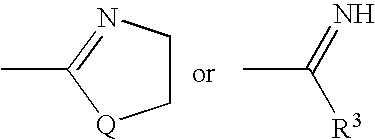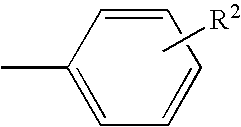Thiazole derivatives
a technology of thiazole and derivatives, applied in the field of thiazole derivatives, can solve the problems of high physical and economic burden on patients, difficult irradiation of lasers on the macular area, and unnecessary laser treatments that may produce side effects
- Summary
- Abstract
- Description
- Claims
- Application Information
AI Technical Summary
Benefits of technology
Problems solved by technology
Method used
Image
Examples
production example 1
[0170] Step 1
[0171] A mixture of 3-chloro-2-oxopropyl acetate (5 g) and thiourea (2.5 g) in ethanol (25 ml) was refluxed for 4 hours. The reaction mixture was cooled to ambient temperature and the resulting crystalline precipitate was collected by filtration and washed with ethanol (20 ml) to give (2-amino-1,3-thiazol-4-yl)methyl acetate hydrochloride (3.5 g) as white crystals.
[0172]1H-NMR (DMSO-d6), δ (ppm): 2.07(3H, s), 4.92(2H, s), 6.87(1H, s).
[0173] MS: 173(M+H)+
Step 2
[0174] To a mixture of (2-amino-1,3-thiazol-4-yl)methyl acetate hydrochloride (56 g) and pyridine (45 g) in dichloromethane (560 ml) was added acetyl chloride (23 g) over a period of 30 minutes at 5° C., and the reaction mixture was stirred for 10 minutes at the same temperature. The reaction mixture was poured into water (500 ml) and extracted with chloroform (1 L). The organic layer was dried over sodium sulfate and concentrated in vacuo. The residual solid was collected by filtration with isopropyl ether to...
production example 2
Synthesis of N-(4-(2-(4-(4,5-dihydro-1,3-thiazol-2-ylamino)phenyl)ethyl)-1,3-thiazol-2-yl)acetamide
[0194] N-(4-(2-(4-Aminophenyl)ethyl)-1,3-thiazol-2-yl)acetamide (1.8 g) prepared in a similar manner according to Step 6 of Production Example 1,2-(methylsulfanyl)-4,5-dihydro-1,3-thiazole (918 mg), hydrochloric acid concentrate (0.57 ml) and 2-methoxyethanol (28 ml) were combined under nitrogen atmosphere, and stirred at 120° C. for 10 hours. After cooled to room temperature, the reaction mixture was concentrated in vacuo. The residue was dissolved in tetrahydrofuran / water, and made basic with aqueous potassium carbonate. The mixture was extracted with ethyl acetate. The organic layer was dried over magnesium sulfate, and evaporated in vacuo. The residue was purified by flash column chromatography over silica gel with chloroform / methanol (30:1→20:1) as an eluent, and triturated with ethyl acetate to give N-(4-(2-(4-(4,5-dihydro-1,3-thiazol-2-ylamino)phenyl)ethyl)-1,3-thiazol-2-yl)ace...
production example 3
Synthesis of N-(4-{(E)-2-[4-(4,5-dihydro-1,3-thiazol-2-ylamino)phenyl]ethenyl}-1,3-thiazol-2-yl)acetamide
Step 1
[0198] A mixture of 4-nitrobenzyl bromide (6.35 g), triphenylphosphine (7.71 g) and N,N-dimethylformamide (50 ml) was stirred for 5 hours at room temperature. To the mixture were added potassium butoxide (3.96 g), and then N-(4-formyl-1,3-thiazol-2-yl)acetamide (5.0 g) prepared in a similar manner according to Step 4 of Production Example 1, and the mixture was stirred for 13 hours at the same temperature. The reaction mixture was poured into ethyl acetate (200 ml) and water (200 ml). The organic layer was washed with water (20 ml), dried over sodium sulfate and concentrated in vacuo. The crystalline residue was collected and washed with 30% ethyl acetate / diisopropyl ether to give N-{4-[(E)-2-(4-nitrophenyl)ethenyl]-1,3-thiazol-2-yl}acetamide (7.8 g).
[0199]1H-NMR (DMSO-d6), δ (ppm): 2.16(3H, s), 7.29(1H, d, J=16 Hz) 7.48(1H, d, J=16 Hz), 7.88(2H, d, J=7 Hz), 8.22(2H, d,...
PUM
| Property | Measurement | Unit |
|---|---|---|
| temperature | aaaaa | aaaaa |
| temperature | aaaaa | aaaaa |
| temperature | aaaaa | aaaaa |
Abstract
Description
Claims
Application Information
 Login to View More
Login to View More - R&D
- Intellectual Property
- Life Sciences
- Materials
- Tech Scout
- Unparalleled Data Quality
- Higher Quality Content
- 60% Fewer Hallucinations
Browse by: Latest US Patents, China's latest patents, Technical Efficacy Thesaurus, Application Domain, Technology Topic, Popular Technical Reports.
© 2025 PatSnap. All rights reserved.Legal|Privacy policy|Modern Slavery Act Transparency Statement|Sitemap|About US| Contact US: help@patsnap.com



